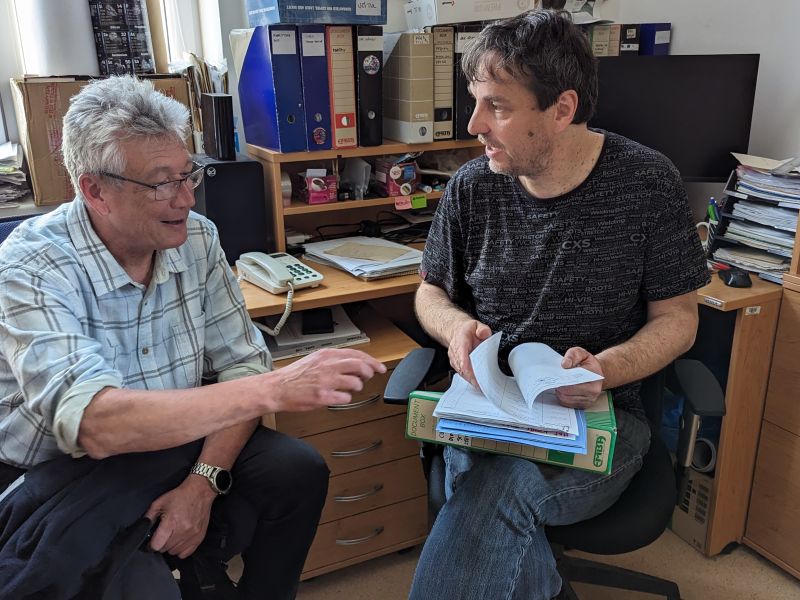Prvním zahraničním odborníkem, který na naši fakultu přijel v rámci projektu UčiTUL, byl Andrei Strukov, který působí jako vedoucí Centra podpory na Univerzitě Maine v Augustě (UMA), kde vede tým zaměřený na podporu kvality výuky a instruktážního designu. Na FP TUL prováděl hloubkový monitoring výukových procesů – vedl mnohé rozhovory a navštěvoval výuku, aby získal hlubší vhled do každodenní reality výuky na naší fakultě. Zajímaly ho především živé osobní, profesní a studijní zkušenosti těch, s nimiž měl příležitost se setkat. Zjišťoval, jak studenti a učitelé vnímají své potřeby, role a povinnosti a jaká jsou jejich přání v kontextu na studenta zaměřené výuky.
Přečtěte si rozhovor, ve kterém Andrei shrnul své zkušenosti a dojmy z výuky na FP TUL.
What led you to participate in this project, and what motivated you to accept your role as a researcher in the UčiTUL project?
I was truly motivated to join the UčiTUL project because it offered a wonderful opportunity to bring together my 20 years of classroom teaching experience with my work in faculty development and support. The chance to engage with colleagues and students from a different continent and country was incredibly exciting to me. It was an opportunity to not only apply my expertise in a new setting but also to gain fresh insights and perspectives. Meeting and hearing from people at the Technical University of Liberec was both enriching and inspiring, making this experience personally fulfilling as well as professionally rewarding.
What do you think meaningful teacher education should look like?
Meaningful teacher education should be a blend of theory and practice, with a strong emphasis on real-world application. It’s important for future teachers to not only understand educational theories but also to see how those theories play out in the classroom. This means integrating plenty of hands-on experiences, such as teaching practice and classroom observation, where students can engage with real students and real situations.
Moreover, teacher education should foster a mindset of lifelong learning. Teaching is a dynamic profession, and being open to continuous learning and adaptation is crucial. Courses that encourage critical thinking, reflection, and adaptability are key.
Finally, meaningful teacher education should cultivate a deep understanding of student-centered teaching. This involves training future teachers to be responsive to the needs and interests of their students, creating inclusive, engaging, and supportive learning environments where every student has the opportunity to thrive.
What is the difference between the teaching methods at your home university and at TUL?
One of the key differences between the teaching methods at my home university in the United States and those at TUL lies in the emphasis on student-centric approaches. At my home institution, the student’s learning experience is at the heart of everything we do. Teachers are viewed as learning partners, working closely with students to help them develop the skills and knowledge they need to succeed. This collaborative relationship is reflected in the way classes are structured, with a strong focus on interactive, practical activities that encourage critical thinking and active participation.
In contrast, at TUL, there seems to be a greater reliance on traditional, teacher-centric methods. While this approach has its strengths, such as ensuring thorough coverage of content, it can sometimes lead to more passive learning environments where students have fewer opportunities to engage directly with the material or contribute to discussions.
That being said, there is a growing recognition at TUL of the need to incorporate more interactive and student-focused teaching methods, as highlighted by the feedback from both students and teachers in my recent study. This shift toward a more balanced approach, combining the strengths of both traditional and student-centric methods, could greatly enhance the learning experience for students at TUL.
What have been your most interesting experiences during the implementation of this project?
One of the most interesting experiences for me during this project has been the opportunity to engage in deep conversations with both teachers and students at TUL. Hearing their perspectives on education, and understanding their challenges and aspirations, was incredibly eye-opening. It was fascinating to see how differently educational practices can be approached, even though the ultimate goal—student success—is the same everywhere.
Another highlight was observing the traditional teaching methods in action and then discussing with faculty members their thoughts on integrating more student-centric approaches. These discussions often led to lively debates, which were both intellectually stimulating and very rewarding.
Finally, I found the cultural exchange aspect to be immensely enriching. Experiencing the Czech educational environment firsthand, and comparing it with my own experiences in the United States, provided me with fresh insights that I will carry forward in my own work. The blend of tradition and innovation I observed at TUL has inspired me to think differently about how we approach teaching and learning.
Za zprostředkování rozhovoru děkujeme Magdě Nišponské a Petře Romportlové, které s Andreiem Strukovem během jeho pobytu v květnu a červnu 2024 úzce spolupracovaly.


